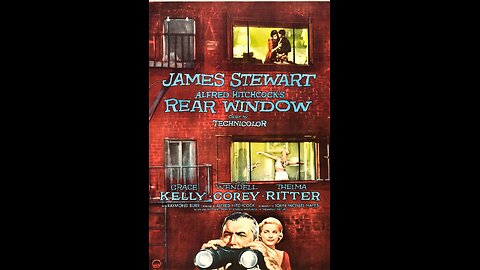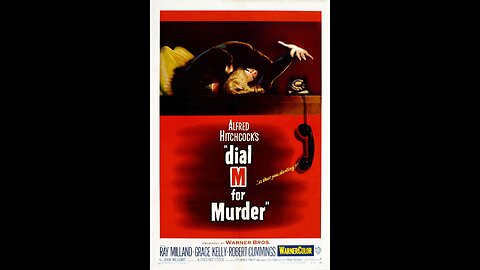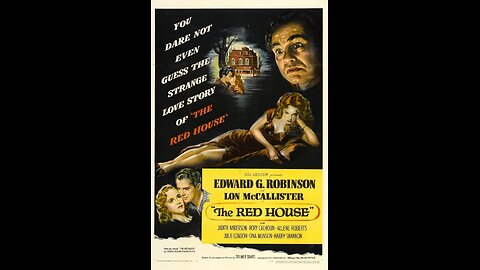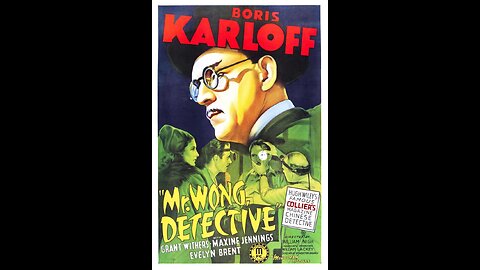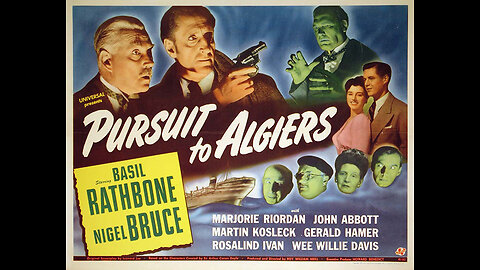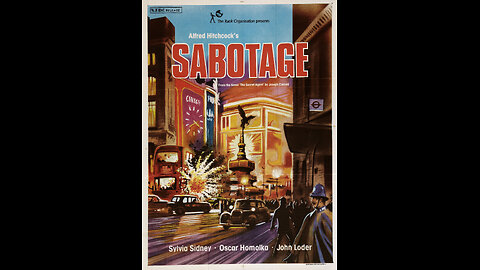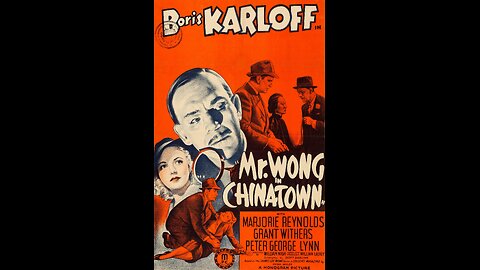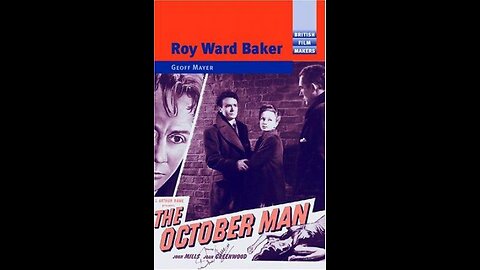
Mystery Thrillers
91 videos
Updated 7 days ago
The Best Mystery Thrillers from the Golden Age
-
October Man (1947) | Directed by Roy Ward Baker
 Classic Films & Movies ArchiveOctober Man is a British psychological thriller about a man recovering from a traumatic accident who becomes the prime suspect in a murder case. The film follows Jim Ackland, who struggles with psychological distress after surviving a bus crash that killed a young girl in his care. As he tries to rebuild his life, he is falsely accused of murdering a woman in his boarding house. Facing police scrutiny and public suspicion, he must prove his innocence while battling his own self-doubt. Genre: Thriller, Crime, Drama Director: Roy Ward Baker Roy Ward Baker was an English filmmaker known for his work in both British and Hollywood cinema. Born in 1916, he gained recognition for directing films across multiple genres, including thrillers, war dramas, and horror films. His most famous works include A Night to Remember (1958), which depicted the Titanic disaster, and several Hammer Horror productions. He was respected for his precise storytelling and ability to create suspenseful atmospheres. Star Cast: - John Mills as Jim Ackland - Joan Greenwood as Jenny Carden - Edward Chapman as Mr. Peachy - Kay Walsh as Molly Newman - Joyce Carey as Mrs. Vinton - Catherine Lacey as Miss Selby October Man received positive reviews for its gripping narrative and John Mills’ compelling performance as the troubled protagonist. Critics praised the film’s psychological depth and atmospheric tension, considering it a standout British thriller of the era. Audiences appreciated its intelligent script and suspenseful plot, which kept viewers guessing until the end. Though not as widely known today, it remains a well-regarded classic in British cinema. Fun Facts: - The screenplay was written by Eric Ambler, a renowned writer of spy and thriller novels. - John Mills, already a major star, was praised for his portrayal of a man suffering from psychological trauma, a theme not commonly explored in films of the time. - The film’s moody cinematography and use of shadows contribute to its noir-like atmosphere, despite being a British production rather than a Hollywood noir. - October Man was one of Roy Ward Baker’s early directorial efforts before he went on to greater fame with historical and horror films. - The film’s title refers to the protagonist’s emotional state rather than the time of year, symbolizing his loneliness and struggles with identity. * This Rumble Movie Channel is comprehensively indexed on https://kinoquick.com - find you favourite movies fast & free! Subscribe to this channel to be notified of daily movie updates.161 views
Classic Films & Movies ArchiveOctober Man is a British psychological thriller about a man recovering from a traumatic accident who becomes the prime suspect in a murder case. The film follows Jim Ackland, who struggles with psychological distress after surviving a bus crash that killed a young girl in his care. As he tries to rebuild his life, he is falsely accused of murdering a woman in his boarding house. Facing police scrutiny and public suspicion, he must prove his innocence while battling his own self-doubt. Genre: Thriller, Crime, Drama Director: Roy Ward Baker Roy Ward Baker was an English filmmaker known for his work in both British and Hollywood cinema. Born in 1916, he gained recognition for directing films across multiple genres, including thrillers, war dramas, and horror films. His most famous works include A Night to Remember (1958), which depicted the Titanic disaster, and several Hammer Horror productions. He was respected for his precise storytelling and ability to create suspenseful atmospheres. Star Cast: - John Mills as Jim Ackland - Joan Greenwood as Jenny Carden - Edward Chapman as Mr. Peachy - Kay Walsh as Molly Newman - Joyce Carey as Mrs. Vinton - Catherine Lacey as Miss Selby October Man received positive reviews for its gripping narrative and John Mills’ compelling performance as the troubled protagonist. Critics praised the film’s psychological depth and atmospheric tension, considering it a standout British thriller of the era. Audiences appreciated its intelligent script and suspenseful plot, which kept viewers guessing until the end. Though not as widely known today, it remains a well-regarded classic in British cinema. Fun Facts: - The screenplay was written by Eric Ambler, a renowned writer of spy and thriller novels. - John Mills, already a major star, was praised for his portrayal of a man suffering from psychological trauma, a theme not commonly explored in films of the time. - The film’s moody cinematography and use of shadows contribute to its noir-like atmosphere, despite being a British production rather than a Hollywood noir. - October Man was one of Roy Ward Baker’s early directorial efforts before he went on to greater fame with historical and horror films. - The film’s title refers to the protagonist’s emotional state rather than the time of year, symbolizing his loneliness and struggles with identity. * This Rumble Movie Channel is comprehensively indexed on https://kinoquick.com - find you favourite movies fast & free! Subscribe to this channel to be notified of daily movie updates.161 views -
Rear Window (1954) | Directed by Alfred Hitchcock
 Classic Films & Movies ArchiveA temporarily wheelchair-bound photographer, Jeff Jeffries, becomes obsessed with watching his neighbors from his apartment window. As he observes their daily lives, he begins to suspect that one of them has committed murder. With the help of his girlfriend and nurse, he sets out to prove his theory, leading to a tense and suspenseful climax. Genre: Mystery, Thriller Director: Alfred Hitchcock Alfred Hitchcock (1899–1980) was an English filmmaker and one of the most influential directors in cinema history. Known as the "Master of Suspense," he revolutionized the thriller genre with innovative camera techniques, psychological depth, and masterful storytelling. His notable films include "Psycho" (1960), "Vertigo" (1958), and "North by Northwest" (1959). Hitchcock’s ability to create tension and his signature cameo appearances made him a legendary figure in Hollywood. Star Cast: - James Stewart as L.B. "Jeff" Jefferies - Grace Kelly as Lisa Fremont - Thelma Ritter as Stella - Raymond Burr as Lars Thorwald - Wendell Corey as Detective Doyle "Rear Window" was a critical and commercial success upon its release and is now regarded as one of Hitchcock’s greatest films. Audiences were captivated by its suspenseful storytelling and unique premise. Over the years, it has remained a staple of film studies and is often cited as one of the best thrillers ever made. The film continues to receive praise for its innovative use of cinematography and its commentary on voyeurism. Fun Facts: - The entire film was shot on a massive indoor set built specifically for the movie, featuring fully functioning apartments. - Alfred Hitchcock makes his signature cameo as a man winding a clock in the songwriter’s apartment. - Grace Kelly’s wardrobe, designed by Edith Head, became iconic and is still celebrated in fashion history. - The film was inspired by a real-life murder case involving British murderer Patrick Mahon. - The movie was restored in the 1990s after being unavailable for many years due to Hitchcock’s rights ownership. * This Rumble Movie Channel is comprehensively indexed on https://kinoquick.com - find you favourite movies fast & free! Subscribe to this channel to be notified of daily movie updates.185 views
Classic Films & Movies ArchiveA temporarily wheelchair-bound photographer, Jeff Jeffries, becomes obsessed with watching his neighbors from his apartment window. As he observes their daily lives, he begins to suspect that one of them has committed murder. With the help of his girlfriend and nurse, he sets out to prove his theory, leading to a tense and suspenseful climax. Genre: Mystery, Thriller Director: Alfred Hitchcock Alfred Hitchcock (1899–1980) was an English filmmaker and one of the most influential directors in cinema history. Known as the "Master of Suspense," he revolutionized the thriller genre with innovative camera techniques, psychological depth, and masterful storytelling. His notable films include "Psycho" (1960), "Vertigo" (1958), and "North by Northwest" (1959). Hitchcock’s ability to create tension and his signature cameo appearances made him a legendary figure in Hollywood. Star Cast: - James Stewart as L.B. "Jeff" Jefferies - Grace Kelly as Lisa Fremont - Thelma Ritter as Stella - Raymond Burr as Lars Thorwald - Wendell Corey as Detective Doyle "Rear Window" was a critical and commercial success upon its release and is now regarded as one of Hitchcock’s greatest films. Audiences were captivated by its suspenseful storytelling and unique premise. Over the years, it has remained a staple of film studies and is often cited as one of the best thrillers ever made. The film continues to receive praise for its innovative use of cinematography and its commentary on voyeurism. Fun Facts: - The entire film was shot on a massive indoor set built specifically for the movie, featuring fully functioning apartments. - Alfred Hitchcock makes his signature cameo as a man winding a clock in the songwriter’s apartment. - Grace Kelly’s wardrobe, designed by Edith Head, became iconic and is still celebrated in fashion history. - The film was inspired by a real-life murder case involving British murderer Patrick Mahon. - The movie was restored in the 1990s after being unavailable for many years due to Hitchcock’s rights ownership. * This Rumble Movie Channel is comprehensively indexed on https://kinoquick.com - find you favourite movies fast & free! Subscribe to this channel to be notified of daily movie updates.185 views -
Dial M for Murder (1954) | Directed by Alfred Hitchcock
 Classic Films & Movies Archive"Dial M for Murder" is a 1954 thriller directed by Alfred Hitchcock. The film centers on Tony Wendice, a former tennis player who plots to murder his unfaithful wife, Margot, to inherit her wealth. When the plan fails, Tony manipulates the situation to frame Margot for murder, leading to a suspenseful investigation. Genre: Thriller Director: Alfred Hitchcock Alfred Hitchcock (1899–1980) was a British filmmaker renowned for his mastery of suspense and psychological thrillers. Dubbed the "Master of Suspense," his prolific career spanned six decades, during which he directed classics like "Psycho," "Rear Window," and "Vertigo." Hitchcock's innovative storytelling and cinematic techniques have left an indelible mark on the film industry. Star Cast: - Ray Milland as Tony Wendice, the scheming husband. - Grace Kelly as Margot Wendice, Tony's unsuspecting wife. - Robert Cummings as Mark Halliday, Margot's lover and an American crime writer. - John Williams as Chief Inspector Hubbard, the astute detective investigating the case. - Anthony Dawson as Charles Swann (Captain Lesgate), the man Tony blackmails to commit the murder. Upon its release, "Dial M for Murder" received positive reviews for its tight plotting and Hitchcock's direction. Bosley Crowther of The New York Times described it as a "technical triumph" and praised the performances, especially John Williams as the detective. Variety noted that while there were some weaknesses in the setup, Hitchcock's suspenseful techniques and the actors' performances glossed over them to a large extent. Over time, the film has been recognized as a classic, with The Guardian in 2012 calling it "a taut, acidly funny thriller." It was also listed by the American Film Institute in 2001 in AFI's 100 Years...100 Thrills (#48) and in 2008 in AFI's 10 Top 10 (#9 in Mysteries). Fun Facts: 1. The film was originally shot in 3D, capitalizing on the early 1950s 3D movie trend. However, due to waning interest in the format, it was primarily released in 2D. 2. "Dial M for Murder" was based on a successful stage play of the same name by Frederick Knott, who also penned the screenplay for the film. 3. Grace Kelly's performance in this film marked her first collaboration with Hitchcock, leading to subsequent roles in "Rear Window" and "To Catch a Thief." 4. The entire film is predominantly set within the Wendice apartment, reflecting its theatrical origins and creating a claustrophobic atmosphere that heightens the tension. 5. A remake titled "A Perfect Murder" was released in 1998, starring Michael Douglas, Gwyneth Paltrow, and Viggo Mortensen, offering a modern take on the classic story. Find your favorite movies fast: This Rumble movie channel is fully indexed on https://kinoquick.com199 views 1 comment
Classic Films & Movies Archive"Dial M for Murder" is a 1954 thriller directed by Alfred Hitchcock. The film centers on Tony Wendice, a former tennis player who plots to murder his unfaithful wife, Margot, to inherit her wealth. When the plan fails, Tony manipulates the situation to frame Margot for murder, leading to a suspenseful investigation. Genre: Thriller Director: Alfred Hitchcock Alfred Hitchcock (1899–1980) was a British filmmaker renowned for his mastery of suspense and psychological thrillers. Dubbed the "Master of Suspense," his prolific career spanned six decades, during which he directed classics like "Psycho," "Rear Window," and "Vertigo." Hitchcock's innovative storytelling and cinematic techniques have left an indelible mark on the film industry. Star Cast: - Ray Milland as Tony Wendice, the scheming husband. - Grace Kelly as Margot Wendice, Tony's unsuspecting wife. - Robert Cummings as Mark Halliday, Margot's lover and an American crime writer. - John Williams as Chief Inspector Hubbard, the astute detective investigating the case. - Anthony Dawson as Charles Swann (Captain Lesgate), the man Tony blackmails to commit the murder. Upon its release, "Dial M for Murder" received positive reviews for its tight plotting and Hitchcock's direction. Bosley Crowther of The New York Times described it as a "technical triumph" and praised the performances, especially John Williams as the detective. Variety noted that while there were some weaknesses in the setup, Hitchcock's suspenseful techniques and the actors' performances glossed over them to a large extent. Over time, the film has been recognized as a classic, with The Guardian in 2012 calling it "a taut, acidly funny thriller." It was also listed by the American Film Institute in 2001 in AFI's 100 Years...100 Thrills (#48) and in 2008 in AFI's 10 Top 10 (#9 in Mysteries). Fun Facts: 1. The film was originally shot in 3D, capitalizing on the early 1950s 3D movie trend. However, due to waning interest in the format, it was primarily released in 2D. 2. "Dial M for Murder" was based on a successful stage play of the same name by Frederick Knott, who also penned the screenplay for the film. 3. Grace Kelly's performance in this film marked her first collaboration with Hitchcock, leading to subsequent roles in "Rear Window" and "To Catch a Thief." 4. The entire film is predominantly set within the Wendice apartment, reflecting its theatrical origins and creating a claustrophobic atmosphere that heightens the tension. 5. A remake titled "A Perfect Murder" was released in 1998, starring Michael Douglas, Gwyneth Paltrow, and Viggo Mortensen, offering a modern take on the classic story. Find your favorite movies fast: This Rumble movie channel is fully indexed on https://kinoquick.com199 views 1 comment -
Fog Island (1945) | An American mystery film directed by Terry O. Morse
 Classic Films & Movies Archive"Fog Island" is a 1945 American mystery film directed by Terry O. Morse. The story revolves around Leo Grainger, played by George Zucco, a wealthy man who invites a group of people to his mansion on a foggy island. As they gather, Grainger announces his plan to revenge himself on those he believes have wronged him. The tension rises as dark secrets are revealed, and the characters navigate the eerie atmosphere of the island shrouded in fog. The film is known for its suspenseful plot and atmospheric setting.50 views
Classic Films & Movies Archive"Fog Island" is a 1945 American mystery film directed by Terry O. Morse. The story revolves around Leo Grainger, played by George Zucco, a wealthy man who invites a group of people to his mansion on a foggy island. As they gather, Grainger announces his plan to revenge himself on those he believes have wronged him. The tension rises as dark secrets are revealed, and the characters navigate the eerie atmosphere of the island shrouded in fog. The film is known for its suspenseful plot and atmospheric setting.50 views -
House of Secrets (1936) | American mystery film directed by Roland D. Reed
 Classic Films & Movies Archive"House of Secrets" is a 1936 American mystery film directed by Roland D. Reed. The story follows a young lawyer named Barry Wilding, played by Leslie Fenton, who finds himself entangled in a web of mystery and intrigue. When Barry takes on a case involving a missing girl and a disputed will, he discovers a sinister plot involving hidden identities, secret passages, and a grand mansion with a dark history. As he delves deeper into the secrets of the house, Barry must navigate through a complex web of deception to uncover the truth. The film combines elements of mystery and drama, typical of the era's storytelling, to create an engaging and suspenseful narrative.50 views
Classic Films & Movies Archive"House of Secrets" is a 1936 American mystery film directed by Roland D. Reed. The story follows a young lawyer named Barry Wilding, played by Leslie Fenton, who finds himself entangled in a web of mystery and intrigue. When Barry takes on a case involving a missing girl and a disputed will, he discovers a sinister plot involving hidden identities, secret passages, and a grand mansion with a dark history. As he delves deeper into the secrets of the house, Barry must navigate through a complex web of deception to uncover the truth. The film combines elements of mystery and drama, typical of the era's storytelling, to create an engaging and suspenseful narrative.50 views -
The Red House (1947) | A psychological mystery thriller directed by Delmer Daves
 Classic Films & Movies Archive"The Red House" is a psychological mystery thriller directed by Delmer Daves and released in 1947. Based on the novel by George Agnew Chamberlain, the film explores themes of family secrets, guilt, and the impact of a haunting past. Starring Edward G. Robinson, Lon McCallister, Judith Anderson, and Allene Roberts, the movie is known for its atmospheric cinematography and suspenseful narrative. The story revolves around Pete Morgan (Edward G. Robinson), a farmer who lives with his sister Ellen (Judith Anderson) and their adopted daughter Meg (Allene Roberts). Pete harbors a mysterious and dark secret related to the titular red house, a foreboding structure located in the woods near their farm. As Meg grows curious about her past and the red house, Pete becomes increasingly protective and evasive. When Meg befriends Nath Storm (Lon McCallister), a classmate, and invites him to work on the farm, the already tense atmosphere becomes even more charged. Nath's curiosity about the red house intensifies, leading to the gradual unraveling of long-buried secrets and traumatic events. The film delves into the psychological toll of guilt and the consequences of suppressing painful memories. Edward G. Robinson delivers a powerful performance as Pete Morgan, capturing the character's inner turmoil and the weight of his secrets. Lon McCallister and Allene Roberts offer solid performances as the young protagonists who unwittingly become entangled in the dark history of the Morgan family. Judith Anderson, known for her role in "Rebecca," adds depth to the film as the enigmatic sister, Ellen. The film's cinematography, led by Bert Glennon, contributes significantly to its eerie atmosphere. The use of shadow and light in depicting the isolated rural setting and the foreboding red house enhances the suspense and tension throughout the narrative. Miklós Rózsa's haunting musical score complements the film's mood, adding to the sense of unease and mystery. The score, characterized by its atmospheric and emotionally resonant themes, enhances the overall impact of the storytelling. "The Red House" is notable for its departure from traditional genre conventions, blending elements of psychological drama with the mystery and thriller genres. It explores the impact of trauma on individuals and the interconnectedness of past and present. The film's subtle and atmospheric approach to storytelling, coupled with strong performances, has contributed to its status as a cult classic in the realm of psychological thrillers. Overall, "The Red House" is a compelling exploration of family secrets and the psychological toll of suppressed memories, offering a unique and atmospheric take on the thriller genre from the classic Hollywood era.159 views
Classic Films & Movies Archive"The Red House" is a psychological mystery thriller directed by Delmer Daves and released in 1947. Based on the novel by George Agnew Chamberlain, the film explores themes of family secrets, guilt, and the impact of a haunting past. Starring Edward G. Robinson, Lon McCallister, Judith Anderson, and Allene Roberts, the movie is known for its atmospheric cinematography and suspenseful narrative. The story revolves around Pete Morgan (Edward G. Robinson), a farmer who lives with his sister Ellen (Judith Anderson) and their adopted daughter Meg (Allene Roberts). Pete harbors a mysterious and dark secret related to the titular red house, a foreboding structure located in the woods near their farm. As Meg grows curious about her past and the red house, Pete becomes increasingly protective and evasive. When Meg befriends Nath Storm (Lon McCallister), a classmate, and invites him to work on the farm, the already tense atmosphere becomes even more charged. Nath's curiosity about the red house intensifies, leading to the gradual unraveling of long-buried secrets and traumatic events. The film delves into the psychological toll of guilt and the consequences of suppressing painful memories. Edward G. Robinson delivers a powerful performance as Pete Morgan, capturing the character's inner turmoil and the weight of his secrets. Lon McCallister and Allene Roberts offer solid performances as the young protagonists who unwittingly become entangled in the dark history of the Morgan family. Judith Anderson, known for her role in "Rebecca," adds depth to the film as the enigmatic sister, Ellen. The film's cinematography, led by Bert Glennon, contributes significantly to its eerie atmosphere. The use of shadow and light in depicting the isolated rural setting and the foreboding red house enhances the suspense and tension throughout the narrative. Miklós Rózsa's haunting musical score complements the film's mood, adding to the sense of unease and mystery. The score, characterized by its atmospheric and emotionally resonant themes, enhances the overall impact of the storytelling. "The Red House" is notable for its departure from traditional genre conventions, blending elements of psychological drama with the mystery and thriller genres. It explores the impact of trauma on individuals and the interconnectedness of past and present. The film's subtle and atmospheric approach to storytelling, coupled with strong performances, has contributed to its status as a cult classic in the realm of psychological thrillers. Overall, "The Red House" is a compelling exploration of family secrets and the psychological toll of suppressed memories, offering a unique and atmospheric take on the thriller genre from the classic Hollywood era.159 views -
Mr. Wong, Detective (1938) | American mystery film directed by William Nigh
 Classic Films & Movies Archive"Mr. Wong, Detective" is a 1938 American mystery film directed by William Nigh and featuring Boris Karloff in the title role. The film is part of the Mr. Wong series, where Karloff plays James Lee Wong, a Chinese detective. In this installment, Mr. Wong is enlisted to solve a case involving the murder of shipping magnate Simon Dayton. As Wong investigates, he unravels a complex web of motives, secrets, and suspects. The plot is enriched with elements of suspense, intrigue, and a touch of the exotic, characteristic of detective films from the era. Boris Karloff brings his distinctive presence to the role, portraying the astute and enigmatic detective with his usual flair. "Mr. Wong, Detective" is a product of its time, capturing the essence of 1930s mystery cinema.55 views
Classic Films & Movies Archive"Mr. Wong, Detective" is a 1938 American mystery film directed by William Nigh and featuring Boris Karloff in the title role. The film is part of the Mr. Wong series, where Karloff plays James Lee Wong, a Chinese detective. In this installment, Mr. Wong is enlisted to solve a case involving the murder of shipping magnate Simon Dayton. As Wong investigates, he unravels a complex web of motives, secrets, and suspects. The plot is enriched with elements of suspense, intrigue, and a touch of the exotic, characteristic of detective films from the era. Boris Karloff brings his distinctive presence to the role, portraying the astute and enigmatic detective with his usual flair. "Mr. Wong, Detective" is a product of its time, capturing the essence of 1930s mystery cinema.55 views -
Sherlock Holmes: Pursuit to Algiers (1945)
 Classic Films & Movies Archive"Sherlock Holmes: Pursuit to Algiers" is a classic detective film released in 1945, featuring the iconic detective Sherlock Holmes and his loyal companion Dr. John Watson. Portrayed by Basil Rathbone and Nigel Bruce, respectively, Holmes and Watson embark on another thrilling adventure that takes them to the exotic location of Algiers. The story unfolds as Holmes is tasked with ensuring the safe transport of the heir to the throne of a fictional European country, who is traveling on a passenger ship bound for Algiers. The detective must protect the young heir from potential threats and unravel a complex mystery that unfolds during the sea voyage. As the ship sails through treacherous waters, Holmes uses his unparalleled deductive skills to uncover a web of intrigue, deception, and danger. The film captures the essence of Sir Arthur Conan Doyle's original stories, with Rathbone delivering a captivating performance as the brilliant and astute detective. "Pursuit to Algiers" combines elements of suspense, mystery, and adventure, keeping audiences on the edge of their seats as Holmes navigates through the challenges presented by the high-stakes mission. Nigel Bruce's portrayal of Dr. Watson adds a touch of humor and camaraderie to the dynamic duo's interactions. With its engaging plot, atmospheric setting, and the chemistry between Rathbone and Bruce, "Sherlock Holmes: Pursuit to Algiers" stands as a noteworthy entry in the series of Sherlock Holmes films from the 1940s. It continues to be appreciated by fans of classic detective cinema for its enduring appeal and timeless storytelling.110 views
Classic Films & Movies Archive"Sherlock Holmes: Pursuit to Algiers" is a classic detective film released in 1945, featuring the iconic detective Sherlock Holmes and his loyal companion Dr. John Watson. Portrayed by Basil Rathbone and Nigel Bruce, respectively, Holmes and Watson embark on another thrilling adventure that takes them to the exotic location of Algiers. The story unfolds as Holmes is tasked with ensuring the safe transport of the heir to the throne of a fictional European country, who is traveling on a passenger ship bound for Algiers. The detective must protect the young heir from potential threats and unravel a complex mystery that unfolds during the sea voyage. As the ship sails through treacherous waters, Holmes uses his unparalleled deductive skills to uncover a web of intrigue, deception, and danger. The film captures the essence of Sir Arthur Conan Doyle's original stories, with Rathbone delivering a captivating performance as the brilliant and astute detective. "Pursuit to Algiers" combines elements of suspense, mystery, and adventure, keeping audiences on the edge of their seats as Holmes navigates through the challenges presented by the high-stakes mission. Nigel Bruce's portrayal of Dr. Watson adds a touch of humor and camaraderie to the dynamic duo's interactions. With its engaging plot, atmospheric setting, and the chemistry between Rathbone and Bruce, "Sherlock Holmes: Pursuit to Algiers" stands as a noteworthy entry in the series of Sherlock Holmes films from the 1940s. It continues to be appreciated by fans of classic detective cinema for its enduring appeal and timeless storytelling.110 views -
Sabotage (1936) | Alfred Hitchcock's thriller based on Joseph Conrad's novel "The Secret Agent"
 Classic Films & Movies ArchiveAlfred Hitchcock's "Sabotage" is a British thriller released in 1936, based on Joseph Conrad's novel "The Secret Agent." The film is often considered one of Hitchcock's early masterpieces and showcases his adeptness at building suspense and tension. While it shares a title with Conrad's novel, the plot diverges significantly. The story is set in London and follows Sylvia Verloc (Sylvia Sidney), the wife of a cinema owner and secret saboteur, Karl Verloc (Oskar Homolka). Unbeknownst to Sylvia, her husband is involved in a terrorist plot to sabotage the city. Verloc is coerced by a foreign embassy to carry out the act, and his contact in the embassy is a mysterious figure known as the Professor (played by Peter Lorre). As Verloc becomes entangled in the dangerous world of espionage and terrorism, tensions rise. The suspense intensifies when Verloc's plan goes awry, leading to unintended consequences. Hitchcock skillfully employs his trademark techniques, including the use of everyday settings for suspenseful scenarios and manipulating the audience's emotions through character development and plot twists. One of the most memorable sequences in the film involves Sylvia carrying a package, unaware that it contains a bomb set to detonate. Hitchcock's meticulous pacing and tension-building techniques during this scene have been praised for their effectiveness. The film explores themes of deception, betrayal, and the moral dilemmas faced by individuals caught in the web of espionage. Hitchcock's ability to create suspense is evident throughout, and the film culminates in a climactic and morally complex finale. "Sabotage" is notable for its atmospheric cinematography, which captures the mood of pre-war London. The performances, particularly those of Sylvia Sidney and Oskar Homolka, contribute to the film's impact. Hitchcock's collaboration with cinematographer Bernard Knowles resulted in visually striking sequences that added to the overall tension and mood. While Hitchcock took creative liberties with Conrad's source material, "Sabotage" stands as a testament to his early mastery of the thriller genre. The film's exploration of terrorism, moral ambiguity, and the psychological toll of espionage contributes to its status as a classic in Hitchcock's filmography.99 views
Classic Films & Movies ArchiveAlfred Hitchcock's "Sabotage" is a British thriller released in 1936, based on Joseph Conrad's novel "The Secret Agent." The film is often considered one of Hitchcock's early masterpieces and showcases his adeptness at building suspense and tension. While it shares a title with Conrad's novel, the plot diverges significantly. The story is set in London and follows Sylvia Verloc (Sylvia Sidney), the wife of a cinema owner and secret saboteur, Karl Verloc (Oskar Homolka). Unbeknownst to Sylvia, her husband is involved in a terrorist plot to sabotage the city. Verloc is coerced by a foreign embassy to carry out the act, and his contact in the embassy is a mysterious figure known as the Professor (played by Peter Lorre). As Verloc becomes entangled in the dangerous world of espionage and terrorism, tensions rise. The suspense intensifies when Verloc's plan goes awry, leading to unintended consequences. Hitchcock skillfully employs his trademark techniques, including the use of everyday settings for suspenseful scenarios and manipulating the audience's emotions through character development and plot twists. One of the most memorable sequences in the film involves Sylvia carrying a package, unaware that it contains a bomb set to detonate. Hitchcock's meticulous pacing and tension-building techniques during this scene have been praised for their effectiveness. The film explores themes of deception, betrayal, and the moral dilemmas faced by individuals caught in the web of espionage. Hitchcock's ability to create suspense is evident throughout, and the film culminates in a climactic and morally complex finale. "Sabotage" is notable for its atmospheric cinematography, which captures the mood of pre-war London. The performances, particularly those of Sylvia Sidney and Oskar Homolka, contribute to the film's impact. Hitchcock's collaboration with cinematographer Bernard Knowles resulted in visually striking sequences that added to the overall tension and mood. While Hitchcock took creative liberties with Conrad's source material, "Sabotage" stands as a testament to his early mastery of the thriller genre. The film's exploration of terrorism, moral ambiguity, and the psychological toll of espionage contributes to its status as a classic in Hitchcock's filmography.99 views -
Mr. Wong in Chinatown (1939) | American mystery film featuring Boris Karloff
 Classic Films & Movies Archive"Mr. Wong in Chinatown" is a 1939 American mystery film directed by William Nigh and featuring Boris Karloff as the titular character, James Lee Wong. This film is part of the Mr. Wong series, where Karloff portrays the Chinese detective. In this installment, Mr. Wong finds himself immersed in a case involving the murder of an antique dealer. As he delves into the crime, Wong navigates the intricate alleys of Chinatown, uncovering secrets and motives that lead to a suspenseful climax. The film incorporates elements of mystery, crime, and a touch of the exotic, echoing the conventions of detective cinema from the late 1930s. Boris Karloff delivers a compelling performance as Mr. Wong, bringing his unique charisma to the role of the astute detective. "Mr. Wong in Chinatown" reflects the storytelling style of its time and contributes to the series' legacy of classic mystery films.74 views
Classic Films & Movies Archive"Mr. Wong in Chinatown" is a 1939 American mystery film directed by William Nigh and featuring Boris Karloff as the titular character, James Lee Wong. This film is part of the Mr. Wong series, where Karloff portrays the Chinese detective. In this installment, Mr. Wong finds himself immersed in a case involving the murder of an antique dealer. As he delves into the crime, Wong navigates the intricate alleys of Chinatown, uncovering secrets and motives that lead to a suspenseful climax. The film incorporates elements of mystery, crime, and a touch of the exotic, echoing the conventions of detective cinema from the late 1930s. Boris Karloff delivers a compelling performance as Mr. Wong, bringing his unique charisma to the role of the astute detective. "Mr. Wong in Chinatown" reflects the storytelling style of its time and contributes to the series' legacy of classic mystery films.74 views
